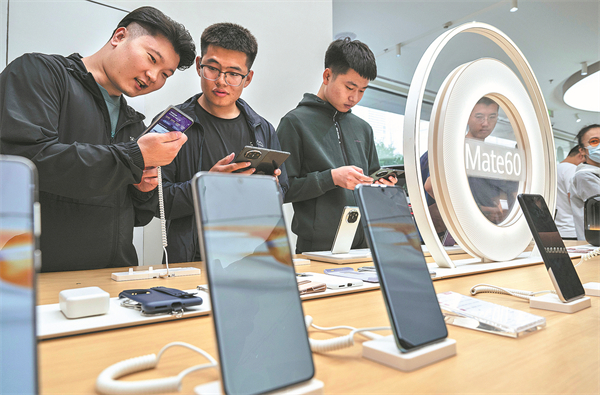
- Home
- Media Center
-
Events
- Wuzhen Summit
- Regional Forums
- Practice Cases of Jointly Building a Community with a Shared Future in Cyberspace
- World Internet Conference Awards for Pioneering Science and Technology
- The Light of Internet Expo
- Straight to Wuzhen Competition
- Global Youth Leadership Program
- WIC Distinguished Contribution Award
- Membership
- Research & Cooperation
- Digital Academy
-
Reports
- Collection of cases on Jointly Building a Community with a Shared Future in Cyberspace
- Collection of Shortlisted Achievements of World Internet Conference Awards for Pioneering Science and Technology
- Reports on Artificial Intelligence
- Reports on Cross—Border E—Commerce
- Reports on Data
- Outcomes of Think Tank Cooperation Program
- Series on Sovereignty in Cyberspace Theory and Practice
- Other Achievements
- About WIC
- 中文 | EN

Huawei, OpenAI show tech evolution is relentless

Shoppers look at newly launched smartphones at the Huawei flagship store in Beijing. KEVIN FRAYER/GETTY IMAGES
When the United States removed China's tech giant Huawei Technologies Co from its global semiconductor supply chain in 2019, anxiety gripped the Chinese electronics industry.
But there was a silver lining too. Anxiety pushed Chinese firms to work on chips for more advanced smartphones. For their part, the authorities concerned emphasized that self-reliance in key technologies is critical to the future.
What ensued in consequence over the past few years is that the whole Chinese tech ecosystem developed unprecedented capabilities that even the US probably had not anticipated or expected.
So, when Corporate China appeared to be anxious again in the wake of OpenAI's launch of its text-to-video model Sora in February, it gave me a sense of deja vu. I breathed easy.
For, I, being a dyed-in-the-wool tech reporter, am aware that nearly four years after the US ban, Huawei has already unveiled its Mate 60 series phone powered by the Kirin 9000S chip, despite the obstacles. For the uninitiated, the Kirin 9000S' performance is comparable to one- or two-year-old chips from Qualcomm, according to various testing teams.
It is by now clear that no technological breakthrough happens overnight — and no technological progress elsewhere, nor unfair policy curbs imposed by other countries, can stymie China for a long time.
So, at the people level, it helps to view technological advancements rationally and become aware of the kind of challenges China is facing. As for the emergence of OpenAI's Sora, Chinese tech fans don't need to get anxious over local firms' perceived ceding of lead to their foreign counterparts. Huawei's experience should indicate that any sense of lagging behind in the cutting-edge technology will likely be temporary.
Truth to tell, China has the ability to develop text-to-video models. It's just a matter of time before similar products emerge eventually.
To reiterate, technological evolution doesn't happen overnight. Nor is it the sole preserve of a certain company. Patience is the watchword here.
When Huawei made its chip breakthrough, it was its US counterparts that turned anxious. Many voices blamed the US government, saying its ban merely ended up accelerating China's drive for self-reliance in advanced chips.
"Perhaps the most surprising fact about the Huawei breakthrough is that so many US government leaders were evidently surprised," said Gregory Allen, director of the Wadhwani Center for AI and Advanced Technologies, in a report about Huawei's new phone.
It is as though tech anxiety is shuttling between the world's two largest economies, given that the US has always tried to make everything on its own.
But history shows no country can single-handedly drive or control the future of tech. As China always insists, in the era of globalization, any attempts by a country to impede globalization will only hurt its own interests.
As for ChatGPT, Sora and similar tech breakthroughs, their proliferation, application and commercialization are more important than their advent itself. I doubt if the US can progress on its own in these aspects.
It's worth recalling that OpenAI was founded with the intention of making the evolution of AI open. Recent developments seem to suggest that only openness and collaboration can lead to technological momentum that will benefit the global society.

The World Internet Conference (WIC) was established as an international organization on July 12, 2022, headquartered in Beijing, China. It was jointly initiated by Global System for Mobile Communication Association (GSMA), National Computer Network Emergency Response Technical Team/Coordination Center of China (CNCERT), China Internet Network Information Center (CNNIC), Alibaba Group, Tencent, and Zhijiang Lab.





